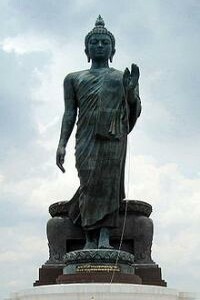Mastering the Core Teachings of Buddha. An Unusually Hardcore Dharma Book | страница 16
There are basic assumptions that are extremely helpful when
undertaking training in morality. It is very helpful to assume that some sort of basic moral code is helpful for getting along in this world, and thus that there is some practical benefit to be derived from training in morality.
It is also helpful to assume in some loose and non-dogmatic way that the more good we do in the world, the more good there will be in that world, and thus the more good things will happen to us and all other beings. It is also worth assuming the corollary of this, that the more we do bad things in the world, the more bad things will be in that world for us and for all beings. These assumptions are not unique to Buddhism nor are they in any way extraordinary. Societies and traditions throughout the ages have advocated that we find a place in our life for these assumptions. Realize that defining bad and good is often very much a question of perspective, but don’t fall into the paralyzing trap of imagining that it is useless to try anyway. It is better to try to do your best and fail than not try at all.
Thus, we are assuming that what we think, say and do have
consequences. When undertaking training in morality, we are assuming that we can control what we think, say and do, thus creating consequences that are beneficial. Rather than accepting our current level of intellectual, emotional and psychological development as being beyond our power to change, we consciously and explicitly take the empowering view that we can work with these aspects of our lives and change them for the better. We assume that we can change our world and our attitudes towards our world. We take responsibility for our actions and their consequences.
Further, as a part of our empowerment, we assume that the more of our resources and abilities we bring to this training, the likelier we will be to succeed. We have a body, we have reason, we have our intuition, we have our heart, and we have ability to learn and remember. We have a community of others with wisdom to share, we have books and other media that contain advice for living the good life, and we have our friends and family. We can draw on all of this and more to try to live a good life, a life where our thoughts, words and deeds reflect as closely as possible the standards we have consciously adopted and defined for 5
Morality, The First and Last TrainingMorality, The First and Last Training


